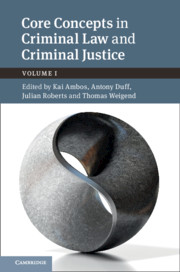Book contents
- Core Concepts in Criminal Law and Criminal Justice
- Core Concepts in Criminal Law and Criminal Justice
- Copyright page
- Contents
- Preface
- Abbreviations
- Contributors
- Part I Introduction
- Part II Criminal Law
- Part III Criminal Justice and Procedure
- 7 Proportionality of Punishment in Common Law Jurisdictions and in Germany
- 8 Criminal History Enhancements at Sentencing
- 9 Due Process
- 10 The Role of the Prosecutor
- 11 Negotiated Case Dispositions in Germany, England and the United States
- 12 Exclusion or Non-Use of Illegally Gathered Evidence in the Criminal Process: Focus on Common Law and German Approaches
- Index
- References
10 - The Role of the Prosecutor
from Part III - Criminal Justice and Procedure
Published online by Cambridge University Press: 19 December 2019
- Core Concepts in Criminal Law and Criminal Justice
- Core Concepts in Criminal Law and Criminal Justice
- Copyright page
- Contents
- Preface
- Abbreviations
- Contributors
- Part I Introduction
- Part II Criminal Law
- Part III Criminal Justice and Procedure
- 7 Proportionality of Punishment in Common Law Jurisdictions and in Germany
- 8 Criminal History Enhancements at Sentencing
- 9 Due Process
- 10 The Role of the Prosecutor
- 11 Negotiated Case Dispositions in Germany, England and the United States
- 12 Exclusion or Non-Use of Illegally Gathered Evidence in the Criminal Process: Focus on Common Law and German Approaches
- Index
- References
Summary
The prosecutor’s position within the criminal justice system cannot be overstated. Robert Jackson, former United States Attorney General, who gained worldwide reputation through his role as Chief United States Prosecutor at the International Military Tribunal in Nuremberg, remarked fully seventy-five years ago that: ‘The prosecutor has more control over life, liberty, and reputation than any other person in America.’ Prosecutors are ‘the criminal justice system’s real lawmakers’ and ‘the gatekeepers to the justice system’ system’, insofar as they make the crucial decisions about which individuals enter the criminal justice system and under what conditions they move through it.
- Type
- Chapter
- Information
- Core Concepts in Criminal Law and Criminal Justice , pp. 343 - 388Publisher: Cambridge University PressPrint publication year: 2020



